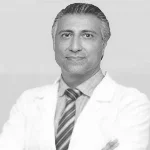
Dr. Omid Modiramani is a highly experienced medical oncologist and clinical hematologist in Dubai with more than 12 years of […]
Liver cancer is a serious disease characterized by the uncontrolled growth of malignant cells within the liver. It is crucial to distinguish between two main origins: primary liver cancer, which begins in the liver itself, and secondary (or metastatic) liver cancer, which occurs when cancer from another organ (like the colon, breast, or lung) spreads to the liver.
The most common form of primary liver cancer is Hepatocellular Carcinoma (HCC), which accounts for the vast majority of cases. Understanding the risk factors is key to prevention and early detection. The most significant ones include:
Chronic Viral Hepatitis: Long-term infection with Hepatitis B (HBV) or Hepatitis C (HCV) is the leading global cause.
Cirrhosis: This condition, where healthy liver tissue is replaced by scar tissue, is a major precursor. Cirrhosis can be caused by chronic hepatitis, alcohol, or non-alcoholic fatty liver disease.
Excessive Alcohol Consumption: Chronic, heavy drinking can lead to cirrhosis and significantly increase cancer risk.
Non-Alcoholic Fatty Liver Disease (NAFLD/NASH): Linked to obesity and type 2 diabetes, this is a rapidly growing cause of liver cancer in developed countries.
Certain Genetic Conditions: Such as hemochromatosis (iron overload) and Wilson’s disease (copper overload).
In its early stages, liver cancer often presents no symptoms. As the disease progresses, the following signs may appear:
Jaundice: Yellowing of the skin and the whites of the eyes.
Pain: Discomfort or pain in the upper right abdomen.
Unexplained Weight Loss and Loss of Appetite.
Feeling Full Quickly: After eating even a small meal.
Nausea and Vomiting.
General Fatigue and weakness.
If liver cancer is suspected, a doctor will use a combination of methods for an accurate diagnosis:
Imaging Tests: Ultrasound, CT scans, and MRI are used to visualize the liver and identify any tumors.
Blood Tests: The Alpha-fetoprotein (AFP) tumor marker test can be elevated in some, but not all, cases of HCC.
Liver Biopsy: In some situations, a small sample of liver tissue is removed with a needle and examined under a microscope to confirm the diagnosis.
The choice of treatment depends heavily on the stage of the cancer, the number and size of tumors, liver function, and the patient’s overall health. Options include:
Surgical Resection: Removing the part of the liver containing the tumor. This is an option if the cancer is localized and the remaining liver is healthy.
Liver Transplantation: Replacing the entire liver with a healthy donor organ. This can be a curative option for select patients.
Ablation Therapy: Using heat (radiofrequency ablation) or cold (cryoablation) to destroy cancer cells without surgery.
Radiation Therapy: Including advanced techniques like Stereotactic Body Radiotherapy (SBRT) to target tumors precisely.
Targeted Therapy & Immunotherapy: These drugs specifically target cancer cell pathways or boost the body’s immune system to fight the cancer.
Liver cancer is often called a “silent” disease because symptoms appear late. This makes early detection challenging but absolutely vital. For individuals at high risk (e.g., those with cirrhosis or chronic hepatitis), regular monitoring with ultrasound and AFP blood tests every six months is essential. Catching the cancer at an early stage dramatically improves the chances of successful treatment and long-term survival. If you have known risk factors, regular consultation with a gastroenterologist or hepatologist is your best defense.

Dr. Omid Modiramani is a highly experienced medical oncologist and clinical hematologist in Dubai with more than 12 years of […]

Dr. Saman Nikeghbalian is a highly esteemed general surgeon and a pioneering figure in the field of organ transplantation in […]

Dr. Maryam Mirzaei Moghadam is a highly skilled radiation oncologist in Tehran specializing in chemotherapy, radiotherapy, and advanced cancer treatments. […]

Dr. Hossein Foudazi is a prominent radiation oncologist based in Tehran, Iran, who has a significant role in the field […]

Dr. Reza Malayeri is a highly respected hematologist and medical oncologist based in Tehran, Iran, with extensive expertise in diagnosing […]

Dr. Masoumeh Saberian is a highly skilled hematologist and medical oncologist based in Tehran, specializing in the diagnosis and treatment […]

Dr. Abbas Zolfaghari is a distinguished gastroenterologist based in Tehran, renowned for his extensive expertise in internal medicine and gastroenterology. […]

Dr. Zohreh Dadvar is a distinguished gastroenterologist based in Tehran, renowned for her extensive experience and expertise in the field […]

Specialized Care for Gastrointestinal and Liver Diseases Dr. Maryam Chorami is a renowned gastroenterologist in Tehran, dedicated to diagnosing and […]

Dr. Mohammad Roshani, born in January 1974, is a highly accomplished gastroenterologist and internal medicine specialist based in Tehran, Iran. With an impressive academic […]

Dr. Hasanali Metanat is a board-certified gastroenterologist and hepatologist with over 25 years of clinical experience in Tehran. Recognized as one of Iran’s foremost digestive […]

Credentials and Specialized Expertise Dr. Gholamreza Moghimi is a highly skilled gastroenterologist in Tehran, renowned for his advanced diagnostic and therapeutic approaches […]